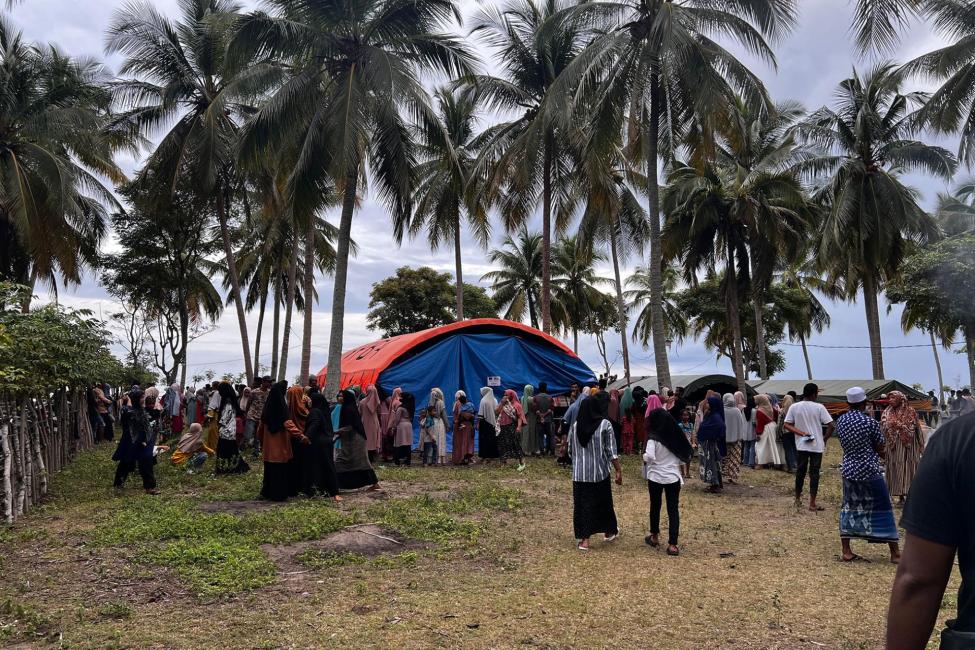-
Who we are
WHO WE AREThe International Organization for Migration (IOM) is part of the United Nations System as the leading inter-governmental organization promoting since 1951 humane and orderly migration for the benefit of all, with 175 member states and a presence in over 100 countries. IOM joined the United Nations system in September 2016.
About
About
IOM Global
IOM Global
-
Our Work
Our WorkAs the leading inter-governmental organization promoting humane and orderly migration, IOM plays a key role to support the achievement of the 2030 Agenda through different areas of intervention that connect both humanitarian assistance and sustainable development.
Cross-cutting (Global)
Cross-cutting (Global)
- Data and Resources
- Take Action
- 2030 Agenda
IOM Appeals for USD 514 Million to Support Ukraine Response
Geneva – The International Organization for Migration (IOM) is today appealing for USD 514 million to support its continued response to the humanitarian needs of war-affected people in Ukraine and neighbouring countries.
Since the start of the war, over 7.7 million people have been internally displaced in Ukraine according to IOM data, while over five million refugees and at least 233,000 third county nationals (TCNs) have sought safety across the border in neighboring countries. Humanitarian needs in the region continue to rise, with affected populations requiring critical support.
IOM is one of the largest humanitarian actors in Ukraine where it has been working since 1996 and continues to engage with states and partners to coordinate response efforts across Ukraine and neighboring countries.
The IOM Flash Appeal aims to reach over 10 million people; eight million in Ukraine and two million people who have fled the country. Persons targeted for assistance include internally displaced persons (IDPs), refugees, third-country nationals, and vulnerable populations including women, children, elderly people and those with disabilities.
The Organization will continue to support national and local governments, as well as non-governmental and civil society partners, across a variety of sectors. A key component of the response will be to enhance capacities to manage collective informal shelters, accommodation centres, reception and transit sites in a safe and dignified manner. IOM will also provide temporary shelter and non-food items to those in need.
Faced with mounting health needs, IOM will continue to improve access to healthcare and support outbreak preparedness and response. Medical teams are deployed, offering services such as wellness screenings and mental health and psychosocial support. In addition, IOM is working to improve Water, Sanitation and Hygiene (WASH) infrastructure and service provision, which have been severely affected by the hostilities.
IOM’s Displacement Tracking Matrix (DTM) is also being scaled up to better understand mobility dynamics and strengthen the wider humanitarian response to the crisis.
The Organization’s established supply chain in the region will continue to facilitate the delivery of humanitarian assistance to populations in hard-to-access areas. IOM’s presence and logistics capacity enables it to address the immediate food and livelihood needs of vulnerable individuals, including through distributing food parcels and providing multipurpose cash-based assistance.
With the war raising an array of protection concerns, IOM is offering protection services to vulnerable people, including survivors of and people at risk of trafficking and gender-based violence, unaccompanied and separated migrant children, people with disabilities and third country nationals.
IOM operates hotlines to share up-to-date information on services, referral mechanisms, border crossings, and trafficking prevention and reporting in Ukraine and neighbouring countries IOM is further leveraging its vast experience in humanitarian movements by supporting voluntary transits, resettlement and return assistance.
Thanks to the generosity of donors and partners, this appeal will enable IOM on the ground to meet these humanitarian objectives, protect those forcibly displaced inside and outside Ukraine and uphold their human rights and dignity.
IOM’s Global Crisis Response Platform provides an overview of IOM’s plans and funding requirements to respond to the evolving needs and aspirations of those impacted by, or at risk of, crisis and displacement in 2022 and beyond. The Platform is regularly updated as crises evolve, and new situations emerge.
For more information, contact:
In Geneva:
Safa Msehli, smsehli@iom.int +41794035526
Paul Dillon, pdillon@iom.int, +41796369874

